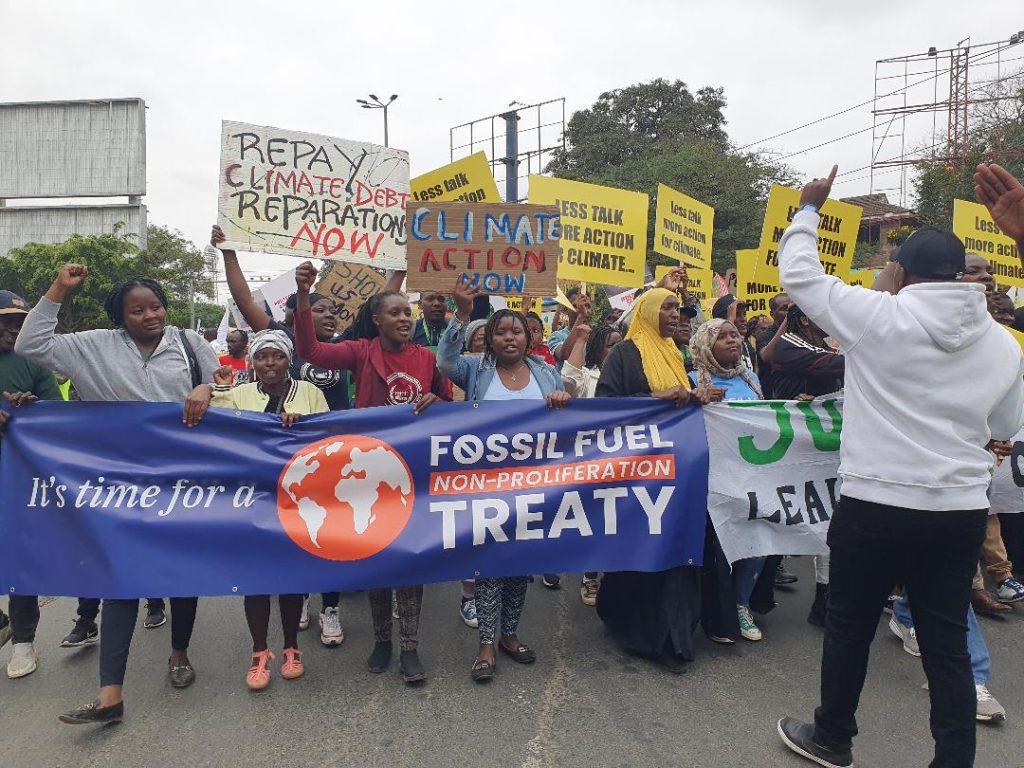By: Elizabeth Angira
Worth Noting:
- The advantages of renewable energy go beyond simply powering schools. Kenyan schools can create a more conducive and stimulating learning environment for their students by implementing renewable energy solutions. With reliable electricity, schools can implement technology-driven learning methods, improve internet connectivity, and extend learning hours beyond daylight.
- Kemunto reveals that she used to suffer from chest complaints while using firewood, often leading to hospitalizations.
- It was only during a hospital visit that she learned about the detrimental effects of smoke. Initially, she didn’t take the doctor’s advice seriously, but as her health deteriorated, she decided to switch to LPG gas.
Education is the foundation for individual and societal progress across Kenya’s vast and diverse landscape. However, in many schools, a lack of access to reliable and affordable electricity poses a significant barrier to quality education. In the midst of this challenge, renewable energy shines as a beacon of hope, providing a transformative solution to power Kenya’s education systems and illuminate the path to a brighter future.
Kenya has an abundance of renewable energy resources, including solar, geothermal, and wind power. By utilizing these abundant resources, schools can break free from the constraints of unreliable grid electricity and embrace a sustainable and cost-effective energy source.
Solar power, in particular, has enormous potential for Kenya’s schools. Solar panels can be installed on school roofs to convert sunlight directly into electricity, powering classrooms, computers, and other essential equipment. This clean and renewable energy source can provide schools with the consistent electricity they require to operate effectively, regardless of grid limitations.
The advantages of renewable energy go beyond simply powering schools. Kenyan schools can create a more conducive and stimulating learning environment for their students by implementing renewable energy solutions. With reliable electricity, schools can implement technology-driven learning methods, improve internet connectivity, and extend learning hours beyond daylight.
Furthermore, renewable energy can power extracurricular activities, fostering a vibrant and engaging school environment that promotes holistic development. Evening classes, sports activities, and cultural events can all be held at schools using clean and sustainable energy.
A Driver of Social and Economic Progress
 Joyce kemuma student says that the solar lamp helps her whole family. Before, her five siblings and she would all gather around the kerosene lamp or a candle to do our assignments. They could barely see.
Joyce kemuma student says that the solar lamp helps her whole family. Before, her five siblings and she would all gather around the kerosene lamp or a candle to do our assignments. They could barely see.
“Now, we simply place the lantern at a central point and with the maximum light settings, we are all able to see without any struggle. I have also gone a grade up in school, from the extra study hours I put in at night using my solar lamp,” says Kemuma.
Principal Albert Ombiro of Cardinal Otunga School highlights a notable improvement in overall school grades, attributing this positive change to extended study hours facilitated by access to electricity and solar power. In the past, families faced challenges purchasing kerosene for lanterns, hindering students’ ability to study effectively.
However, with the advent of alternative energy sources, students can now dedicate additional study time, both early in the morning and late in the evening.
Principal Ombiro acknowledges that the availability of electricity and solar power has eliminated the dependence on kerosene, providing a reliable and sustainable solution.
“This has proven beneficial, especially during power blackouts, as students can continue their studies uninterrupted,” he says.
He commends the Kenyan government for its progressive efforts in diversifying energy sources, creating an environment where schools and households have access to reliable power.
This advancement not only enhances the academic performance of students but also contributes to a more conducive learning environment, reflecting positive strides in the country’s energy sector.
Despite bearing the biggest brunt when it comes to the lack of access to energy or clean cooking fuels, women only account for 16 percent of the traditional energy sector.
Rose Kemunto, now the happiest person to use solar energy and LPG gas, shares her transformative experience.
Kemunto reveals that she used to suffer from chest complaints while using firewood, often leading to hospitalizations.
It was only during a hospital visit that she learned about the detrimental effects of smoke. Initially, she didn’t take the doctor’s advice seriously, but as her health deteriorated, she decided to switch to LPG gas.
“The shift resulted in a significant improvement in her well-being,” she says.
Recalling the arduous process of collecting firewood, Kemunto mentions walking long distances and experiencing backaches.
The constant search for firewood not only consumed much of her time but also exposed her to harmful smoke, making her sick.
She urges other women to consider alternative energy sources like LPG gas and solar energy, emphasizing their environmental friendliness.
Josephine Nyaboke shares her own story, having relied on kerosene lanterns as a source of energy.
She describes how the smoke from the lanterns affected her health, causing her to sneeze and leading to blackened handkerchiefs.
Nyaboke applauds the Kenyan government for introducing electricity and solar power, acknowledging their role in preventing health issues and reducing dependence on fossil fuels.
The impact of renewable energy in Kenya’s education sector extends beyond the school gates, reverberating throughout communities and contributing to overall social and economic progress. Kenya can stimulate economic growth and empower local communities by investing in renewable energy.
Furthermore, renewable energy can reduce reliance on expensive and polluting diesel generators, contributing to environmental sustainability and improving air quality. This, in turn, can lead to improved public health outcomes and lower healthcare costs.
Taking Advantage of the Opportunity with a Non-Proliferation Treaty on Fossil Fuels
The Meko-friendly steam cooking technology, a pioneering initiative in Africa, aims to shift schools away from traditional firewood-based cooking methods towards renewable energy sources. Developed by Faith Engineering Works, the technology comprises three key components: a steam generator, steam supply line, and cooking vessels.
In contrast to conventional methods that rely on placing a fire under the cooking pot, this innovation utilizes briquettes to heat water, generating steam. The steam is then dried to elevate temperature and pressure. Director Wycliffe Ng’ong’a emphasizes that this approach significantly reduces cooking time, allowing for the simultaneous use of up to 10 cooking pots.
The cost of implementing the system varies, ranging from Ksh 800,000 to Ksh 20 million, contingent on the number of pots required. The Zero Carbon Schools initiative, a Green Cooking Program endorsed by the National Council for Nomadic Education in Kenya (NACONEK) and the Ministry of Education, aims to facilitate the adoption of low-carbon energy solutions in over 6000 schools, benefiting more than 2.5 million children through the Kenya School Meals Program.
Kenya has a critical role to play as world leaders debate a Fossil Fuel Non-Proliferation Treaty at COP28. The treaty’s pillars of global just transition, non-proliferation, and fair phase-out are consistent with Kenya’s commitment to a green and sustainable future.
As Kenya progresses toward a renewable energy future, the call for a Fossil Fuel Non-Proliferation Treaty gains traction. A Fossil Fuel Non-Proliferation Treaty would halt the expansion of fossil fuel production and infrastructure, hastening the transition to renewable energy and protecting the planet for future generations.
Kenya can show its leadership in climate action and sustainable development by supporting this treaty. The treaty would provide Kenya with the international framework and support it needs to fully embrace renewable energy and power its education systems, ensuring a brighter future for all Kenyans.
Renewable energy represents a transformative opportunity for Kenya’s education sector, providing a sustainable and cost-effective solution to power schools, improve learning environments, and drive social and economic progress. Kenya can illuminate the path to a brighter future by embracing renewable energy and supporting the Fossil Fuel Non-Proliferation Treaty.
The “NACONEK Carbon Offset Project” focuses on introducing eco-friendly cooking solutions in schools, thereby reducing carbon footprints. As part of the broader strategy, the Kenya School Meals Program seeks to promote climate-smart food security by enhancing local small-scale farming, establishing low-carbon energy production and value chains, and reducing reliance on firewood and charcoal.
The transition to energy-saving Jikos for smaller schools and steam cooking systems for larger institutions is a key aspect of the Zero Carbon Schools program. This not only mitigates carbon emissions but also ensures cleaner kitchens. The initiative supports local enterprises, particularly those led by youth and women, by promoting the localized production of briquettes from planted trees.
Furthermore, the use of an organic liquid bio-stimulant, derived locally from seaweed, enhances various agricultural aspects, including stress resistance, maturity rates, rapid growth, pest resistance, increased biomass, and improved soil health. This comprehensive approach aligns with the broader goal of creating environmentally sustainable and resilient school ecosystems.




 Elizabeth Angira is a trailblazing climate journalist whose work bridges science, policy, and human impact. As Senior Climate Reporter at The Mount Kenya Times, she leads in-depth coverage on climate resilience, energy innovation, and sustainability across East Africa and beyond. Her storytelling has earned international acclaim, including a third-place win for “The Best Energy Story in Foreign Media” by the Global Energy Association in Moscow.
Elizabeth’s portfolio reflects her commitment to excellence and advocacy:
*************************************************
🏆 Awards & Honors
Elizabeth Angira is a trailblazing climate journalist whose work bridges science, policy, and human impact. As Senior Climate Reporter at The Mount Kenya Times, she leads in-depth coverage on climate resilience, energy innovation, and sustainability across East Africa and beyond. Her storytelling has earned international acclaim, including a third-place win for “The Best Energy Story in Foreign Media” by the Global Energy Association in Moscow.
Elizabeth’s portfolio reflects her commitment to excellence and advocacy:
*************************************************
🏆 Awards & Honors
